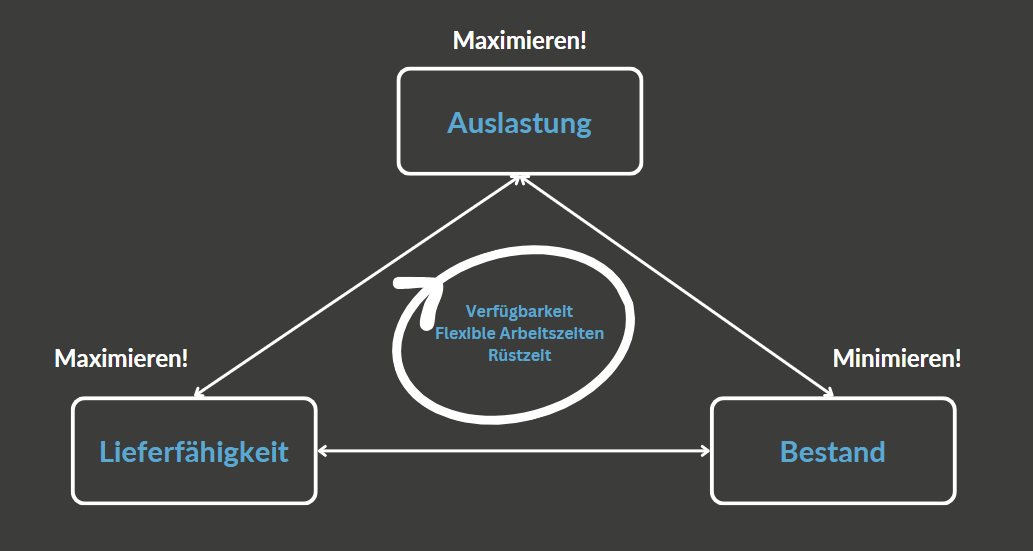Why are LLMs unsuitable for production planning?
Good question! GPT can do everything, can’t it? Have you tried the new open source tool DeepSeek-R1 ? It is undoubtedly exciting what AI models can do these days. In the world of artificial intelligence, large language models (LLMs) are a big topic of conversation. They write impressive texts, answer complex questions and impress with their versatility. But can they also be used in areas such as production planning? The answer is no – at least not when it comes to creating highly optimized production plans, which are crucial for companies.
We take this question as an opportunity to take a closer look at why LLMs are unsuitable for this purpose and why specialized systems are the right way to unleash the full potential of production processes.
The challenge in production planning
Production planning is one of the most complex optimization problems in industry. Companies have to take numerous factors into account:
- On-time delivery: How can orders be planned so that delivery deadlines are met?
- Resource efficiency: How can machines, employees and materials be used optimally without risking overloads or idle times?
- Resource availability: Which resources are available and when?
- Disruptive factors and robustness: How does the plan react to machine breakdowns or unexpected changes?
Solving such problems requires a deep understanding of the production processes and the use of specialized algorithms that are specifically optimized for these variables. This is where LLMs reach their limits.
Why LLMs are unsuitable for production planning
1. LLMs are for text – not for numbers and optimization
LLMs are designed to process language and generate text. They recognize patterns in data and can deliver impressive results in the field of language processing. But production planning is not a text processing task – it is an optimization problem that requires mathematical precision and specific algorithms.
The creation of a production plan requires:
- Weighing up machine, material and personnel resources.
- Meeting delivery deadlines.
- Minimizing downtimes.
LLMs work probabilistically and cannot make optimal decisions within such a complex framework.
2. lack of domain knowledge
LLMs are generalist models. They know “a bit of everything”, but nothing in depth. Production planning, on the other hand, requires a detailed understanding of processes, industry-specific requirements and individual customer needs.
Specialized systems are designed to do just that. They take into account:
- Individual production environments.
- Industry-specific requirements.
- Dynamic adjustments in real time.
3. unreliable results
LLMs are probabilistic systems that use probabilities to generate answers. This makes them flexible in language processing, but unreliable for production planning. An error in the plan – be it an inaccurately calculated delivery date or a misallocation of machines – can cause considerable costs.
Special solutions, on the other hand, were developed with a focus on precision and reliability. Each plan can be checked for technical and economic feasibility using a digital twin before it is implemented.
What is the alternative?
Instead of relying on generative AI such as LLMs, specialized systems are the key. Our DeepSynergy.AI Production Planning solution is specially designed to automatically create highly optimized production plans for highly complex processes – not just on the basis of a fixed algorithm, but dynamically, individually and adaptably.
The advantages of our solution:
- Maximization of KPIs: on-time delivery, optimal utilization, reduced costs.
- Dynamic adaptation: real-time optimization based on current requirements.
- Individual planning: Consideration of all customer-specific variables.
- Reliable results: Precise, validated production plans.
- Security: Integration into local ERP/MES systems with the highest data protection standards.
- Consideration of highly complex conditions: Machine compatibilities, employee qualifications, shift schedules and other operational constraints – all coordinated.
Conclusion
LLMs are powerful when it comes to word processing – but they cannot solve highly complex optimization problems. Production planning is a challenging task that requires specialized technology, domain knowledge and customization to customer processes.
With our AI-based software solution DeepSynergy.AI Production Planning, we overcome these challenges highly efficiently and offer you reliable, precise and optimized planning that takes your production processes to the next level.


